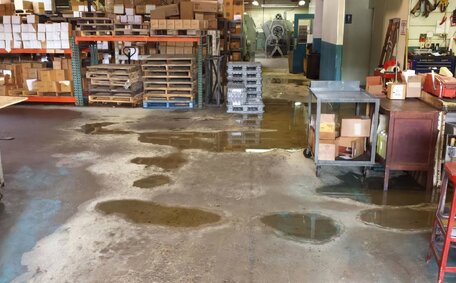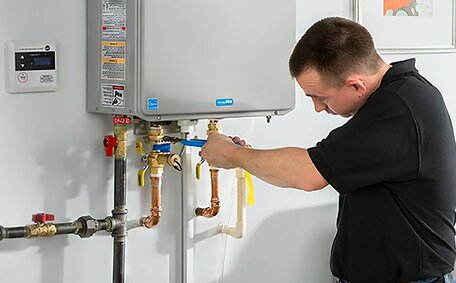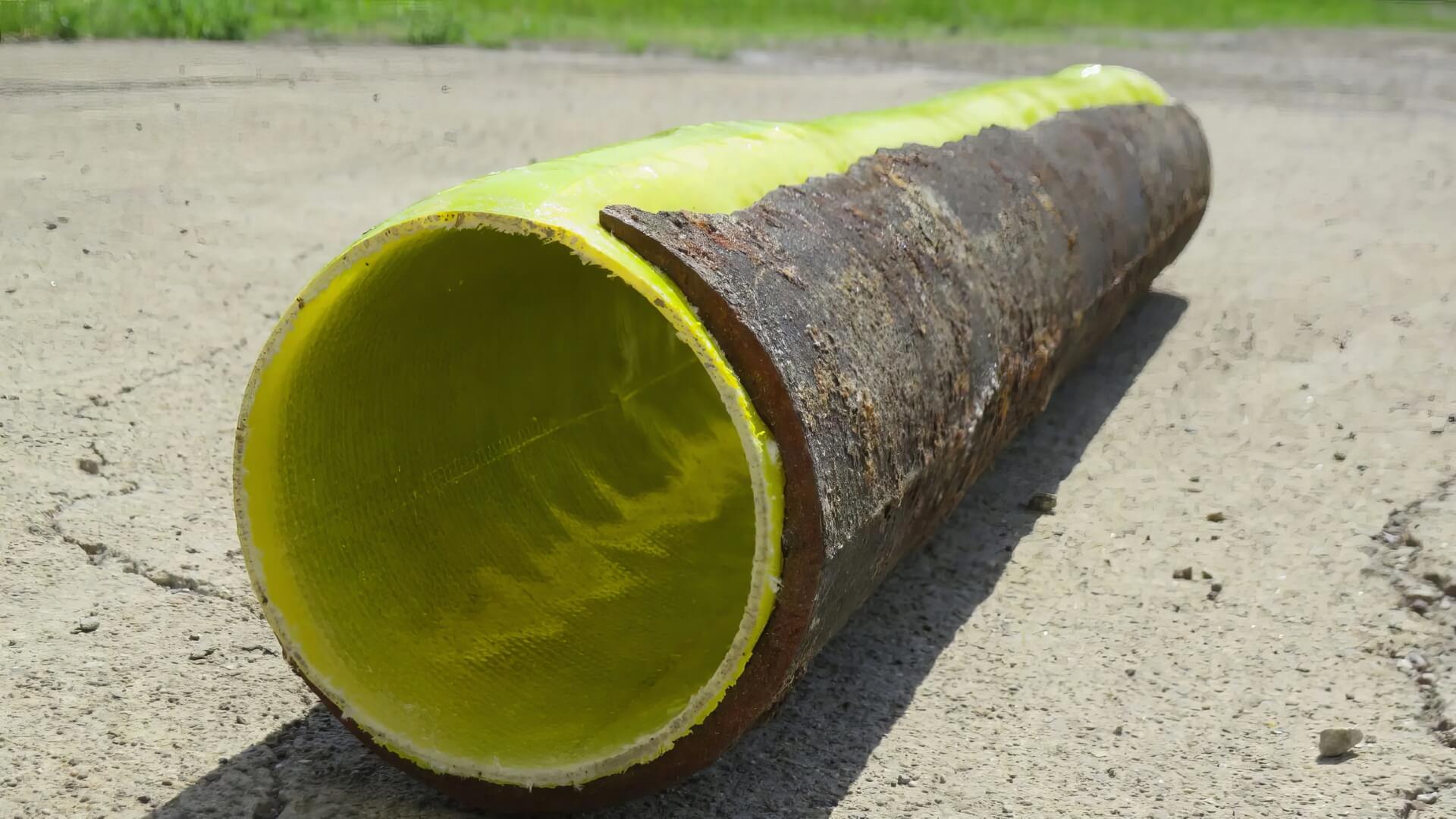
How To Fix Water Heater Issues
Can’t get hot water from your water heater? Try troubleshooting by checking the power supply, thermostat, heating elements and more. Call a pro plumber for repairs.
Read MoreMany homeowners notice their hot tap water appears milky, losing its transparency. The cloudiness typically results from air bubbles trapped in the water, caused by temperature or pressure changes in the plumbing system.
As water exits the heater and is subsequently heated, gases that were dissolved, such as oxygen and methane gas, disengage, forming captive air bubbles. When this hot water travels through the pipes, abrupt pressure variations can trap bubbles in your stream, resulting in cloudy water.
The good news is that the most common cause for your cloudy water,
However, persistent cloudiness may indicate issues like mineral deposits or problematic air bubbles in your system. The best way to address the issue is with your local plumber inspecting your hot water unit and your water pipes if the cloudy quality persists longer than a full day, to rule out potential difficulties.
Overall, though, transient cloudiness in your supply owing to air bubbles is normal and not hazardous - unlike issues with water heaters. Letting your tap run briefly should allow the trapped air to escape, resulting in clear and safe water again.
If running water briefly doesn’t resolve the cloudiness, it’s time to consider other methods for removing air from your system:
If you’ve implemented these strategies and still got cloudy water with your system habitually yielding cloudy outcomes, have a plumber examine the entire water supply your home depends on. Persistent water problem issues could reveal the reasons why it needs repair or replacement.
Upgrading to a tankless water heater or renewing pipelines might address persistent cloudy water issues. Your local hot water experts can advise on the best solutions for your home.
When the tap releases hot water, it appears cloudy due to tiny air bubbles that form and become trapped within the system. As cold water flows out your pipes and is heated, dissolved gases are released, and that is when water coming into contact with your hot water heater.
When heated water undergoes sudden pressure drops from your faucets and pipes, it stabilizes the bubbles, causing them to get trapped. Turning on your hot water tap allows some bubbles to escape, and the water that flows out briefly clears.
While surprising upon first glance, These harmless constituents present no threat in your water glass, safeguarding the liquid’s quality and potability. Consuming cloudy water is safe to drink and will not cause any health issues, as the bubbles originate from natural atmospheric gases we breathe every day.
However, if allowing your taps to flow does not rectify your cloudy hot water, or it happens again, Ensuring your tap water cloudy but safe may involve an inspection of your water heater or consulting on other plumbing concerns. Ensure your hot water unit and pipes are inspected,
air bubbles, Hard water, with its dissolved minerals, is another factor that leads to cloudy tap water.
As hard water is heated, these minerals can come out of solution and accumulate along your hot water lines and tank. Over time this mineral scale buildup causes cloudiness due to particles mixing in the water flow.
Regions with limestone bedrock typically experience hard water supplies. Engage your local water services or use home testing kits to measure mineral levels, especially if you’re in mineral-rich areas like the Gold Coast. This will determine if water softeners or other treatments are recommended.
Despite its safety, hard water can lead to cloudy water and mineral residue, which are addressable through suitable treatments. A plumber can advise on filters, softeners, or descalers to tackle hardness and lessen cloudiness.
If water becomes cloudy when sitting in a glass, it is generally due to harmless air bubbles that disappear within minutes. Nonetheless, if you let the water still for an hour and it stays cloudy, or the cloudiness re-emerges promptly after employing the hot water, this prompts the question - is my hot water cloudy due to the system being implicated in the issue.
Persistent cloudiness can signify problems like:
Do I need to call your local water services for plumbing assistance? It’s wise to reach out to a licenced plumber to examine your plumbing system if the cloudiness in your hot water lingers after 24 hours. They will check vital components like the heating elements, anode rod, pressure relief valve and heat traps.
Replacing worn parts or draining built-up sediment from the system can also restore normal hot water function. Upgrading to a newer energy-efficient unit may be worthwhile if your current system is outdated.
Don’t hesitate to involve a professional if cloudy hot water recurs regularly even after running the taps. Catching small problems early on can prevent more expensive issues down the track.
While trapped air bubbles are harmless, persistent cloudiness or discoloration in hot water could potentially pose health risks if contaminants are present. It’s important to determine the underlying cause.
Your drinking water should be clear and colourless, ensuring its safety for consumption. If allowing cloudy water to settle does not restore clarity, or other issues arise like objectionable taste or smell, further inspection is warranted.
Cloudiness by itself isn’t indicative of risks or impurities in your water most of the time. However, it may indicate problems like:
To investigate cloudy water quality, start by inspecting your hot water unit, pipes and outlets for leaks, corrosion and sediment, assessing what maintenance is being done. It’s wise to also assess your water mains to figure out if the source of the murkiness is external.
If the system is clear of issues, test your water for contaminants to understand the cloudiness. Local health authorities or private labs can assist with specialised drinking water analysis.
While air bubbles cause most benign cases of cloudiness, unexplained and persistent cloudiness warrants further investigation. Seek professional help to determine and resolve the root cause if you have ongoing hot water clarity concerns.
To prevent recurring issues with cloudy hot water, it’s important to properly maintain your hot water system.
Sediment buildup inside the tank or pipes can dislodge and cause your cloudiness. Have a licenced plumber perform professional flushing to clear the lines every 1-2 years.
Also, to improve the quality of your hot water, consider installing a powered anode rod, which reduces the risk of cloudy build-up by drawing corrosion away from the tank walls. Replacing magnesium anode rods with powered aluminium or zinc units reduces sediment.
For hard water areas, using a water softener or regularly descaling your hot water system can help minimise mineral deposits. Descalers dissolve scale so it doesn’t clog pipes or flake off into the water flow. Water softeners can also preemptively remove minerals.
With routine maintenance like flushing, anode rod checks and descaling, you can optimise system integrity and performance. Taking preventative steps will help avoid recurrent issues with cloudy hot tap water.
For mild and temporary cloudiness due to air bubbles, try these DIY steps before consulting a plumber:
However, if you’re attempting to fix cloudy hot issues and the cloudiness persists beyond a day or returns swiftly after use, it likely suggests a systemic air-related maintenance problem requiring professional attention.
Licensed plumbers can thoroughly examine your hot water system to identify and fix any problems. Contact us for a detailed inspection and professional advice.
Can’t get hot water from your water heater? Try troubleshooting by checking the power supply, thermostat, heating elements and more. Call a pro plumber for repairs.
Read MoreCloudy or milky hot water coming from your taps is generally harmless and caused by trapped air bubbles in the water. Simply running the tap for a little while will usually clear up the water. If the cloudiness persists, it could be caused by sediment buildup or issues with your pipes.
Read MorePipe relining involves inserting a tube inside damaged pipes to repair cracks and leaks without digging. This trenchless method may allow pipes and plumbing fixtures to be relocated during bathroom renovations. Contact our expert plumbers to understand if pipe relining can reposition your pipes and fixtures.
Read MoreBaulkham Hills, 2153 NSW
We will call back as soon as possible.




